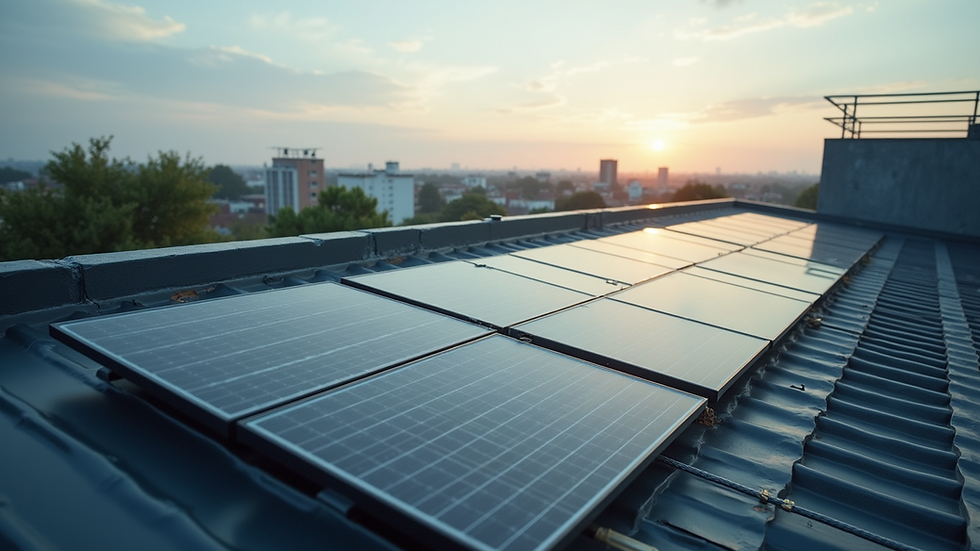Harnessing the Power of Solar Systems: A Comprehensive Guide to Solar Panels and Batteries
- Bill Adams
- Jun 25, 2025
- 4 min read
Solar energy has quickly transformed into a leading alternative to traditional energy sources. As technology improves, it is easier than ever to utilize this energy through solar systems, solar panels, and solar batteries. This guide will walk you through the basics of solar systems and highlight how solar panels and batteries promote energy efficiency and sustainability.
Understanding Solar Systems
A solar system consists mainly of solar panels, an inverter, a solar battery, and additional components that work together to convert sunlight into usable energy. These systems can be set up on rooftops or arranged in larger arrays to capture sunlight effectively.
Solar systems provide renewable energy that can significantly lower electricity bills and reduce carbon footprints. For instance, many homeowners report a 40% reduction in their monthly energy costs after installing solar panels. Understanding how these components function can help individuals and businesses make informed decisions about solar installation.
The Role of Solar Panels
Solar panels are the cornerstone of any solar system. They collect sunlight and turn it into electricity through photovoltaic cells. Efficiency levels in modern solar panels have increased significantly, with top-tier models converting up to 22% of sunlight into usable energy.
Benefits of Solar Panels
Cost Savings: One of the most appealing benefits of solar panels is the reduction in electricity costs. For example, a typical homeowner can save around $1,500 per year on energy bills after switching to solar. The initial investment in solar can often be recouped within 5 to 7 years.
Environmental Impact: Solar panels generate clean energy, helping to reduce greenhouse gas emissions. According to the U.S. Department of Energy, a residential solar panel system can offset about 100 tons of carbon dioxide over its lifetime.
Energy Independence: Generating your electricity reduces dependence on fossil fuels and utility companies. This independence can be especially beneficial during energy crises or fluctuating energy prices, providing stability for homeowners.

Understanding Solar Batteries
While solar panels generate energy, solar batteries are critical for storing that energy when the sun isn't shining. This ability to store energy allows homeowners to utilize their generated energy at night or during cloudy periods, maximizing efficiency.
Advantages of Solar Batteries
Energy Storage: Solar batteries capture excess energy during sunny days, ensuring power availability when you need it. For example, a household that uses 30% of its energy at night can rely on stored solar energy to meet that demand.
Backup Power: Solar batteries can serve as a dependable backup during power outages, giving homeowners peace of mind and security.
Efficient Energy Use: By utilizing stored solar energy, homeowners reduce reliance on the grid, leading to further savings. Reports indicate that users can save an additional 30% on their energy bills by integrating battery storage with their solar systems.
Choosing the Right Solar System
Selecting the right solar system involves considering various factors to ensure it meets your needs effectively:
Energy Needs: Assess your household's energy consumption to determine the size and capacity of the solar system that would be best suited for you.
Roof Orientation: The direction and tilt of your roof considerably influence solar panel efficiency. Roofs facing south usually receive the most sunlight throughout the day, making them ideal for installation.
Budget: Although the upfront costs of solar systems can be significant, it's essential to explore state incentives, tax credits, or financing options that may make solar more affordable. Many states offer rebates that can cover up to 25% of installation costs.
Quality of Components: Opt for high-quality solar panels and batteries from reputable manufacturers. Reliable components enhance the longevity and efficiency of your system, providing better returns on investment.
The Future of Solar Energy
The solar energy industry is projected to experience substantial growth in the coming years. Innovations are continually improving the efficiency of solar panels and batteries, making them more accessible and affordable. In fact, according to industry forecasts, solar installations are expected to increase by over 25% annually through 2025.
As global energy demands shift toward sustainable sources, investments in solar systems are likely to rise. This trend presents opportunities for environmentally conscious individuals and businesses aiming to lower energy costs and carbon footprints.
Taking Action for a Sustainable Future
Harnessing solar energy through panels and batteries is a decisive move toward sustainable energy consumption. The advantages extend beyond financial savings, contributing positively to environmental health and providing energy independence. With technology continually evolving, now is an excellent time to assess the potential of solar energy.
Investing in solar systems means more than just reducing expenses; it represents commitment to a cleaner and brighter future. As you explore options for solar panels and batteries, remember that every step toward solar energy contributes to a healthier planet.
Whether you are a homeowner wanting to cut costs or a business striving for sustainability, understanding solar systems empowers you to make informed decisions that benefit both your finances and the environment.




Comments